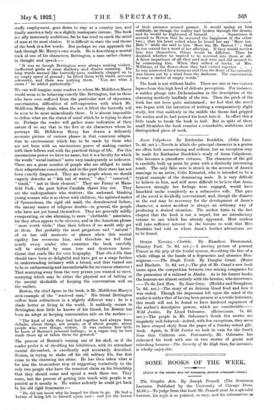OTHER Novus.—Chattels. By Hamilton Drummond. (Stanley Paul. Is. 6d. net.)—A
moving picture of peasant France in the grip of the feudal system, describing the fate of a whole village at the hands of a degenerate and absentee Mon- seigneur.—The Single Track. By Douglas Grant. (Hurst and Blackett. 7s. 6d. net.)—The plot of Mr. Grant's new book turns upon the competition between two mining companies for the possession of a railroad in Alaska. As in his former books, the honours are almost entirely with the heroine, who intervenes. —To the Last Man. By Zane Grey. (Hodder and Stoughton. 7s. 6d. net.)—The story of an Arizona blood feud and how it was ended. Though the impression left upon the mind of the reader is rather that of having been present at a terrific holocaust, this result will not be found to have hindered enjoyment of the author's descriptive powers, which are considerable.— Weld Justice. By Lloyd Osbourne. (Heinemann. 78. 6d. net.)—The people in Mr. Osboume's South Sea stories are singularly well-behaved—indeed, with few exceptions, they seem to have strayed shyly from the pages of a Sunday-school gift- book. Again, in Wild Justice we look in vain for the South Seas that Calderon saw. Fortunately, Mr. Osbourne has redeemed his book with one or two stories of genial and refreshing humour—The Security of the High Seas, for instance, is wholly enjoyable.


































 Previous page
Previous page